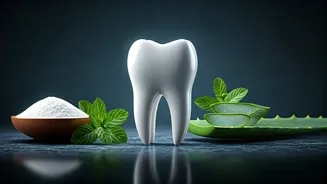Dietary Fiber Power
Fiber-rich foods play a pivotal role in maintaining healthy arteries. Soluble fiber, particularly found in foods like oats, apples, and beans, works by
binding with cholesterol in the digestive system, preventing its absorption into the bloodstream. This process effectively lowers LDL (bad) cholesterol levels, reducing the risk of plaque accumulation. It's recommended to include at least 25-30 grams of fiber in your daily diet, which can be easily achieved by incorporating a variety of fruits, vegetables, and whole grains. Fiber also helps in regulating blood sugar levels, which is crucial because high blood sugar can contribute to arterial damage. Think about starting your day with a bowl of oatmeal or adding lentils to your lunch for an easy fiber boost.
Embrace the Mediterranean
The Mediterranean diet is celebrated for its heart-healthy benefits, primarily due to its emphasis on fresh, whole foods and healthy fats. This dietary pattern is rich in fruits, vegetables, whole grains, legumes, and olive oil. Olive oil, in particular, is a cornerstone, containing monounsaturated fats that help lower LDL cholesterol. Fish, especially those rich in omega-3 fatty acids like salmon and mackerel, should be consumed regularly, as they have anti-inflammatory properties that can protect the arteries. Red meat consumption should be limited, and processed foods should be avoided. Following the Mediterranean diet provides essential nutrients and antioxidants that combat arterial inflammation and oxidative stress, both contributors to plaque formation.
Spice Up Your Life
Incorporating certain spices and herbs into your daily meals can contribute significantly to arterial health. Garlic, for instance, is well-known for its ability to reduce cholesterol levels and prevent blood clots. Turmeric, containing curcumin, has potent anti-inflammatory properties that can help protect against arterial damage. Cayenne pepper, with its capsaicin content, can help improve blood circulation and reduce blood pressure. Cinnamon can assist in regulating blood sugar, which, as mentioned earlier, is a factor in arterial health. By adding these spices to your food, you not only enhance the flavor but also provide your arteries with a protective boost. Experiment with different combinations and enjoy the health benefits!
Regular Physical Activity
Regular exercise is indispensable for maintaining healthy arteries. Physical activity helps lower LDL cholesterol while raising HDL (good) cholesterol, thus reducing plaque buildup and improving overall cardiovascular function. Aim for at least 150 minutes of moderate-intensity aerobic exercise or 75 minutes of vigorous-intensity exercise each week. Activities such as brisk walking, jogging, swimming, and cycling are highly beneficial. Exercise also helps manage blood pressure and weight, which are both risk factors for heart disease. Even incorporating short bursts of activity throughout the day, like taking the stairs or going for a quick walk during your lunch break, can have a positive impact on your arterial health. Consistent exercise makes a measurable impact on your cardiovascular system, ensuring efficient and proper function.
Manage Stress Effectively
Stress can have adverse effects on your arteries. Chronic stress increases the release of stress hormones, leading to inflammation and the potential for plaque buildup. Finding healthy ways to manage stress is vital for arterial health. Techniques such as yoga, meditation, and deep breathing exercises can help reduce stress levels. Engaging in hobbies and activities that you enjoy also provides a welcome distraction and reduces stress. Adequate sleep, typically around 7-9 hours per night, is also crucial for managing stress effectively. Practicing relaxation techniques, like mindfulness or progressive muscle relaxation, can help calm your mind and body, thus contributing to healthier arteries. Prioritize mental well-being; taking time for self-care is as important as diet and exercise.












